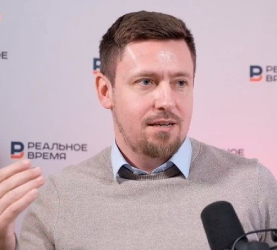Venture capital money loves silence: market overview of Russia and Tatarstan

The Russian venture capital market continued to shrink in 2023. According to the Moscow Innovation Agency, the volume of venture capital investments in the country has decreased by more than 10 times compared to 2022 and has reached a historic low over the past seven years. At the same time, the number of venture capital transactions has increased, but they were concluded mainly with companies at the seed stage, which are characterised by attracting very modest investments. Tatarstan retained its position in the top regions in terms of the number of transactions, and one of them — the sale of KazanExpress to Magnit — thundered throughout Russia. Is the Russian venture still alive and who is saving it — in the review of the analytical service of Realnoe Vremya.
Venture capital is coming to life, but it is becoming less transparent
In 2023, investors concluded 181 deals worth $118.2 million on the Russian venture capital market. The volume of investments decreased by more than 10 times compared to 2022, but the number of transactions increased by 10%. The multidirectional dynamics is associated with an increase in the activity of business angels investing small amounts. Besides, the share of transactions with undisclosed amounts increased — almost a third of the total number. The Russian market is becoming less transparent, and the actual volume of investments may be higher, according to a study by the Moscow Innovation Agency.
The revival in the venture capital market began in the second half of last year: the number of transactions increased in the third quarter, and the fourth quarter became a record number of transactions over the past two years in Russia. This year, the global venture capital market is expected to recover to the level of 2020, as well as the emergence of a large number of new startups in need of financing. Taking into account the dynamics of the last half of the year, Russia can also expect growth in both the number and volume of investments (subject to stabilisation of the geopolitical situation), the agency's experts forecasts.
Moscow has retained its status as the center of investment activity in Russia. The capital still accounts for more than half of the country's venture capital market, both in terms of volume and number of transactions. Tatarstan (Kazan and Innopolis) and St. Petersburg follow it in terms of the number of transactions. Also in 2023, Novosibirsk Oblast with a traditionally strong scientific school was included in the list of venture market leaders. For comparison, in terms of the number of transactions in 2023, 65% account for Moscow, 9% — Tatarstan, 7% — St. Petersburg, and 5% — Novosibirsk Oblast.
For the first time, pre-seed and seed investments accounted for more than 60% not only in terms of the number, but also in terms of the volume of transactions. The volume of seed investments increased 2.5 times in 2023 compared to 2022, however, it was secured by several large transactions, mainly with high-tech startups. Investments in the late stages decreased the most. In 2023, there were only five deals in rounds B and C+.
The top 3 most high-profile market outlets in Russia are Учи.ру (bought by VK for $119.5 million), KazanExpress (bought by Magnit for $103) and CIAN (bought by Real Estate for $39.8).
It's time for business angels
The most active venture investors, according to the Moscow Innovation Agency, were Vimpelcom (13 deals), RT Investment and Venture Fund (IVF) (12 deals), Voskhod Fund (12 deals), Moscow Seed Fund (8 deals), Syndicate Venture Club (8 deals), Kama Flow (7 deals), FRII (7 deals), Coion Investment Syndicate.
In general, private funds reduced the volume of investments by eight times, although formally they continued to lead in the structure of investments: they accounted for 60% of the total volume. In 2023, eight new funds were created, most with a focus on IT.
Government funds have refocused on supporting young companies: 90% of transactions are seed and pre-seed investments.
Corporate investors began to disclose investment amounts less frequently and use other investment instruments more actively, in particular, the number of M&A transactions increased by 25% compared to 2021. Telecom operators (Vimpelcom, MTS, Rostelecom) and large IT companies (Softline and VK) are the most productive. Some of the leaders, such as Sber and Yandex, have reduced their activity over the past two years.
In 2023, for the first time, more than a quarter of the total investment volume was accounted for by business angels (for comparison, 2022 — 8%). Most of them come from the corporate environment (top managers or heads of departments). 80-90% have experience in setting up their own business, and investments are an additional source of income.
Focus on revenue-generating businesses
The focus of investors has shifted to clear, working businesses that generate revenue. The popularity of dividend model has grown, which allows you to start earning within a few years. The transition to dividend model was announced by the FRII. Also, three of the eight venture funds created in 2023: Friendly VC, TIM FORCE Alliance and 3 Streams, plan to invest in projects using the dividend model.
Due to the closure of foreign markets, the technology IPO market was actively developing. In 2023, four companies entered the IPO: Genetico, working in the field of medical genetics, CarMoney, which issues loans secured by cars, Astra Group software developer and Softline IT solutions provider. Four more companies announced plans to enter the IPO: Skyeng educational holding, Motorika, a manufacturer of robotic prostheses, Diasoft, a developer of IT solutions for the financial sector, and Aquarius, a computer manufacturer.
This year, we can expect continued IPOs in the technology sector, which may become an additional tool for investors to exit portfolio companies.
Average cost of startups has decreased by 12 times
Investments in 2023 were more often attracted by B2B startups with IT products and male founders. The share of B2C startups has been steadily decreasing since 2021. 58% are IT companies.
The founders of 82% of startups are exclusively men, while female startups account for only 6% of the total. 46% of the founders have previous entrepreneurial experience, and most come from large and medium-sized companies: they are well-versed in the industry, have initial capital, experience and connections.
In 2023, the valuations of companies and the number of startups targeting the global market have significantly decreased. The share of companies operating in foreign markets at the time of attracting investments has halved — from 35% in 2021 to 14% in 2023.
The average cost of startups decreased by 12 times in 2023, to $11.3 million. The main changes affected companies in rounds A, B and C+. The average estimates of early-stage companies have hardly changed.
Capital has stopped being exported abroad
“This year, the effect of nationalisation of private capital really manifested itself, many entrepreneurs stopped exporting their earnings abroad and began to look for an opportunity to use capital in Russia. This has increased the number of private investors of various sizes, including in venture capital: there are more business angels and members of syndicate clubs," says Vasil Zakiev, the co-founder of Sputnik, ex-project manager of the business incubator of the Kazan and Chelyabinsk IT parks. “The market for over-the-counter financing instruments in the form of the sale of shares or bonds has also risen. In any case, interest in such tools has grown significantly in 2023.”

In 2023, according to him, the trend was set by the Bortnik Foundation, which significantly increased the volume of grant financing for companies at early stages. “A large number of startups in the early stages received amounts from 1 to 4 million rubles, as well as large amounts in the later stages from the fund. This strongly fuels the market," he says.
Betting on students and “downed pilots”

“I would like to believe that in 2024 the market will begin to recover, but I would not be so optimistic here. Deposit rates are quite high now, and as far as I can see, people are actively holding money on deposits, but in general, the investment community is active today and is looking for opportunities to continue investing in the current situation," he says.
Borisov himself also focused on startups at an early stage of development. “Our startup studio is actually a pipeline for the development of startups. Even after leaving the University Startup Studio, we look at promising students who are ready to fit into a startup with a team and a proven idea, but are not ready to go into a startup on their own," he said. “We currently have 14 startups in operation. We expect that we will bring 10 of them to some kind of state this year.”
He also actively develops a community of entrepreneurs, where they collect “downed pilots” who already did projects, got burned and are now not ready to take risks. The startup studio forms new teams from them. “We also thought about creating a fund around our startup studio, but now there is physically not enough time for this, so we postponed the fund a little.”
“There is a lot of noise around startup studios now, and something of this must definitely take off," Borisov is sure.
School for business angels and the announcement of 6-7 billion
“Everything about venture capital deals is a confusing and vague story. And all this is because it is customary to conceal them. It's strange, but this is how the investment market works," says Alexey Taranov, the head of the Startup Hub of the IT park. “Angels and any private investors usually do not promote deals or do it in an inactive manner. Public funds, on the contrary, show everything that has happened and everything that can be attracted since last year, because accountability, transparency and openness are needed. Well, very private money or any Family Office that cannot be found on the Internet always conceals them.” Because of these features, it is very difficult to count the number and quality of transactions, he notes.
“In 2022, despite the February events, there was a lot of investment activity," he said. “In 2023, everyone calmed down, hysteria passed, IT specialists were not taken away, registers of startups and IT companies appeared. The market was divided into the Russian market and with it the market of “friendly countries” and another, which was important and large, but became a stranger, where we are not expected and which throws sanctions at us.”
According to him, domestic funds have become more active, and, for example, the corporate sector has begun to gain momentum and remembered that import substitution is necessary. “And the country's leadership said in plain text at the economic forum in St. Petersburg that it's time to increase the number of corporate venture funds both qualitatively and quantitatively," Taranov recalled.

This year has been super productive for students — 442 student startups have become millionaires and received grants. “We place bets on this segment and help them survive and develop," Alexey said.
“The year 2023 was also active in the IT park: we helped residents attract more than 100 million rubles of venture capital investments and more than 85 million in the form of state grant support," he said. “In 2024, there will be large and bright deals and events, personally, my team and I are setting ambitious plans to increase the startup funnel, develop technology clusters and, of course, the number of deals.”